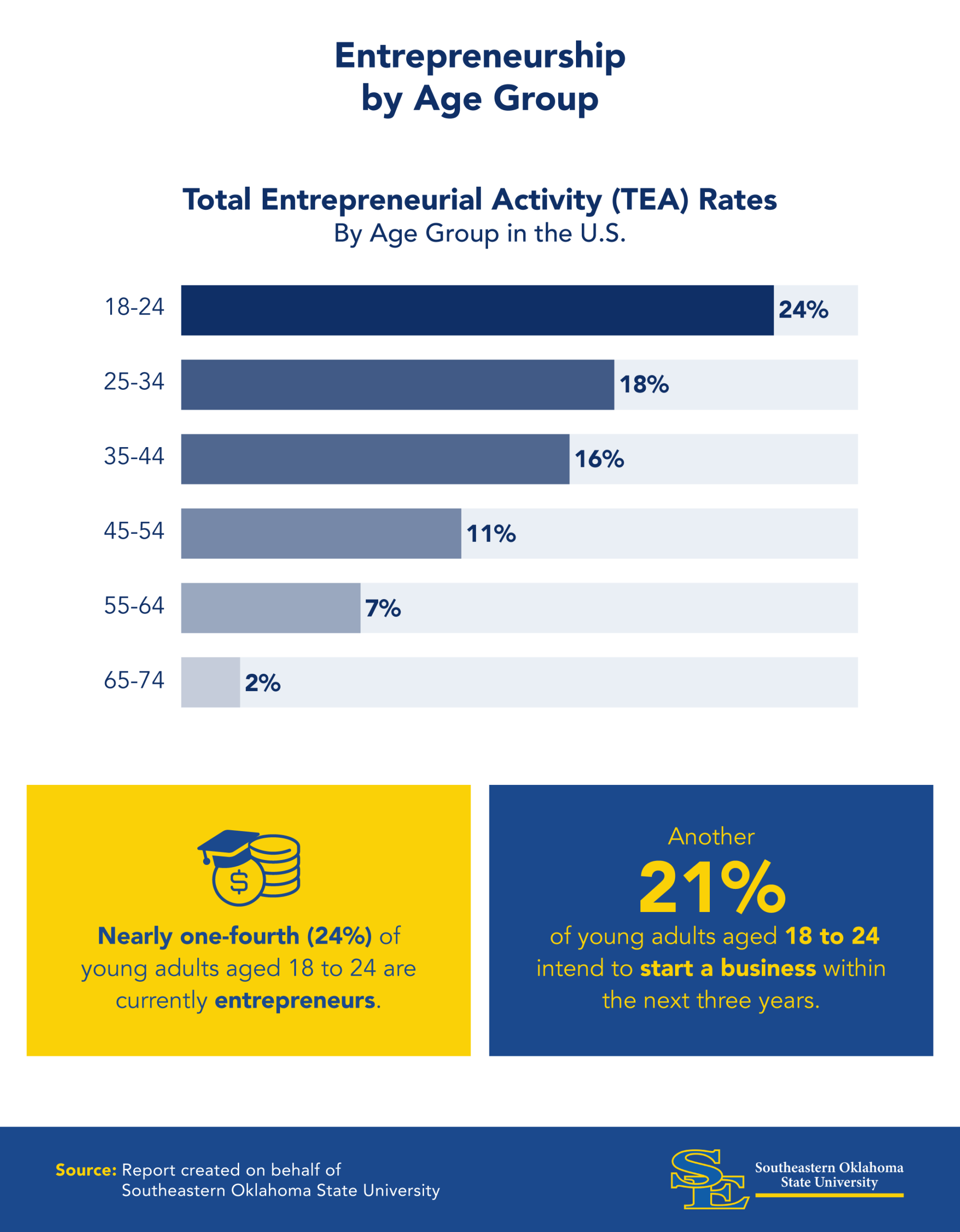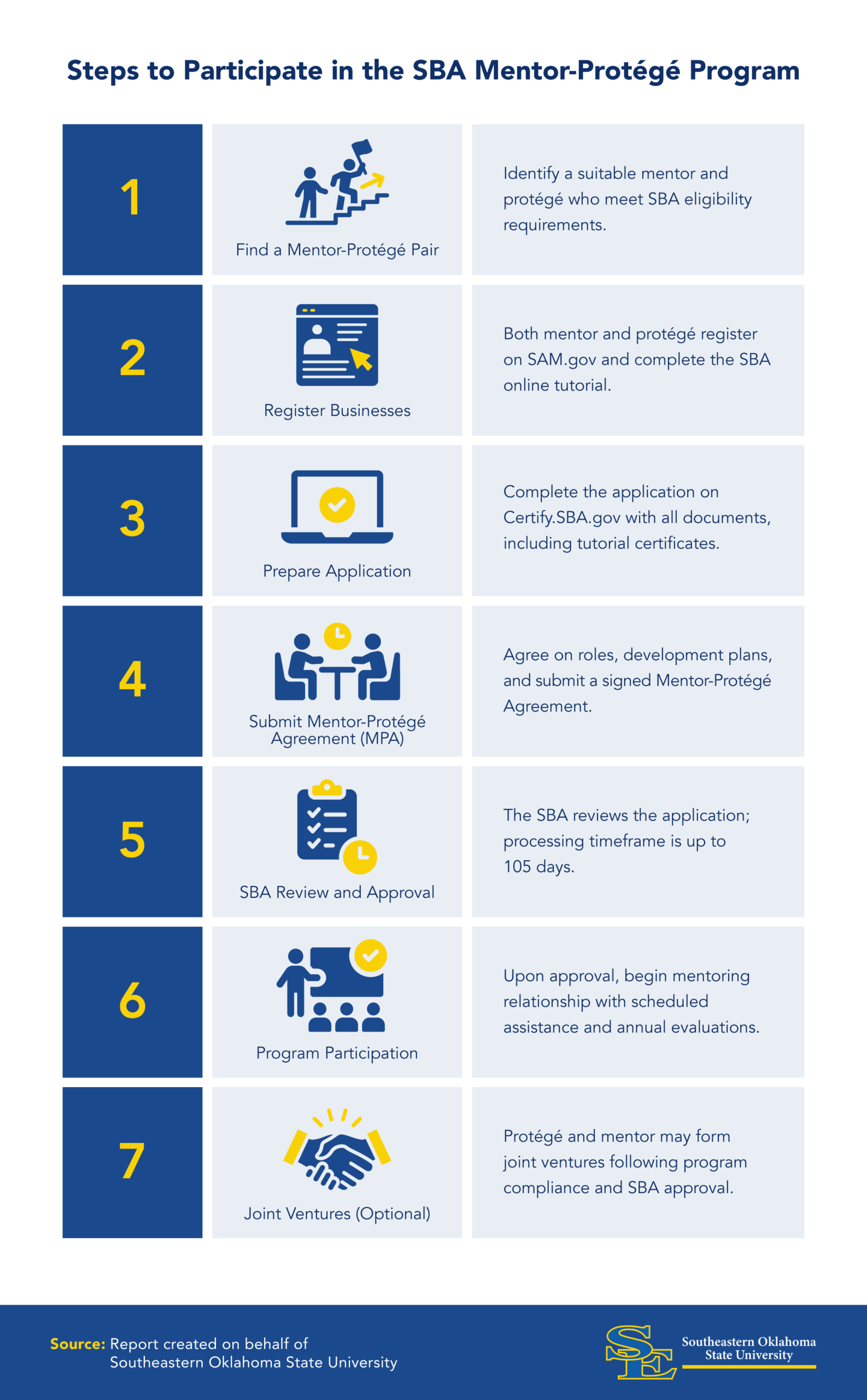
College students are increasingly interested in starting a new business while pursuing their degrees, and many seek guidance on how to turn early ideas into successful businesses. With so many free tools, funding opportunities and legal resources available, understanding where to begin can be challenging.
This report was created on behalf of Southeastern Oklahoma State University to support students who want to explore entrepreneurship during their college years. Southeastern recognizes that some of today’s graduates are not only preparing for traditional careers but are also launching businesses that drive innovation and contribute to the business community. By collecting authoritative sources from the U.S. Small Business Administration (SBA) and other established organizations, this report offers recommendations to help students start and grow their ventures.
Free Business Planning Tools for Student Entrepreneurs
Nearly one in four young adults aged 18 to 24 owns their own business, and 21% plan to become entrepreneurs within the next three years. In addition to passion and drive, students starting a business in college need the right tools to succeed. Fortunately, there is a wide range of free resources that simplify the process.

The tools highlighted below help students develop their own businesses and strengthen professional development skills that carry over into every stage of entrepreneurship. They are designed to help students move from early ideas to execution.
Business Plan Templates and Workshops
- SCORE startup business plan template: A detailed, step-by-step fillable template that walks students through all critical sections of a plan, including executive summary, marketing and financials. SCORE encourages users to complete the template and then seek feedback from a mentor.
- SBA business planning guide: An official SBA guide that includes startup calculators, sample plans and downloadable worksheets. This business resource is tailored for early-stage ventures and simplifies complex planning tasks.
- Lean Canvas templates: A simplified approach to planning that condenses a business plan onto one page. Students can quickly validate ideas and visualize challenges, solutions and customer needs. Free templates and digital whiteboards are available for collaboration.
- SCORE financial templates: Downloadable worksheets for tracking startup expenses, cash flow, income and balance sheets. These tools grant financial clarity from the beginning.
- SBA events and workshops: No-cost sessions that walk students through writing a business plan, conducting research and preparing budgets. These events often feature live Q&A opportunities with advisors and Small Business Development Centers (SBDCs), offering valuable guidance for students on tight budgets or seeking financial aid.
Maximizing Free Software Trials
Students can add to their resources by using free software trials to experiment with project management, accounting and other SaaS platforms. Practical tips include:
- Define needs early: Start with your business plan to decide which software features matter most.
- Take advantage of student offers: Enroll with a school email address to unlock extended trial periods or student discounts.
- Use trials for training: Treat trials as problem-solving and training programs, experimenting with tools to test workflows.
- Engage in learning events: Join tutorials and webinars to learn how to use advanced features before the trial ends.
These strategies ensure that limited trial periods contribute meaningfully to student ventures, rather than becoming costly missteps.
Funding Opportunities That Support Student Entrepreneurs
Finding funding is often one of the most difficult steps for student founders. However, many programs and competitions grant direct support for small business owners and students who want to launch ventures. From national contests to free mentorship programs, these initiatives can spark economic development, strengthen local business networks and help student ideas grow into successful businesses.
Student-friendly Competitions
National and regional competitions offer direct funding to college entrepreneurs while providing visibility in the broader business world.
- e-Fest Undergraduate Entrepreneurship Competition: An annual, nationwide event where undergraduate student teams compete for over $220,000 in cash prizes, national recognition and outstanding networking opportunities. Students submit a business idea and, if selected, are invited to pitch at a three-day event attended by experienced judges, mentors and potential investors. e-Fest is open to all undergraduates enrolled at accredited U.S. colleges and universities.
- Rice Business Plan Competition: The world’s largest and richest student startup competition welcomes student-led teams from U.S. (and global) colleges and universities to compete for over $1.5 million in cash and prizes each year. Participants pitch their ideas to investors, receive expert feedback and gain unparalleled visibility in the national entrepreneurship The competition provides direct seed funding and powerful networking opportunities without regional or institutional bias.
Free Mentorship Programs
Expert guidance can be just as valuable as funding. Free mentorship programs give students a chance to refine strategies, gain confidence and learn from those who have already built successful businesses. SCORE offers free one-on-one mentoring for entrepreneurs, matching students with experienced business professionals across industries. Sessions can be held virtually or in person, making mentorship accessible and flexible.
The Pegasus Angel Accelerator program goes a step further by pairing funding with structured mentoring and coaching. Participants benefit from both financial support and direct access to networks that strengthen technical and leadership skills. The SBA Mentor-Protégé program supplies another pathway. Through a structured process, students and small businesses are paired with seasoned mentors who give long-term guidance. Here’s how it works.

Tips for Applying and Maximizing Opportunities
Students can improve their odds of receiving funding and mentorship by adopting strategic approaches to applications. Best practices include:
- Apply broadly: Submit applications to multiple grants and competitions to increase the likelihood of success.
- Leverage campus resources: Use university innovation centers and incubators for application support and pitch practice.
- Refine through mentorship: Seek feedback from free mentoring programs early to strengthen business plans.
- Engage with accelerators: Use fellowships and accelerators to gain both funding and long-term support.
- Promote your work: Share applications and updates on social media and LinkedIn to gain visibility and demonstrate initiative.
- Learn from peers: Study success stories from past participants to identify what makes a strong application.
- Network strategically: Attend networking events to meet mentors, funders and collaborators who can grant support beyond capital.
Protecting Your Startup
Legal and compliance planning is one of the most important steps in building a sustainable venture. Students can use resources that connect them with experts and tools to address legal risks early and strengthen their approach to business management.
Legal and Compliance Resources for Student Startups
Free contract templates and guides simplify the process of drafting essential documents. When entrepreneurs leverage these legal resources early, they can reduce risk, protect their ideas and ensure their ventures are built on solid ground.
- LegalZoom free business templates: Provides downloadable agreements for partnerships, non-disclosure agreements and client contracts. These templates offer affordable solutions to common startup
- American Bar Association pro bono legal resources: Connects student entrepreneurs to legal aid programs, campus legal clinics and pro bono lawyers. These services give students access to contract review, compliance guidance and intellectual property protection without significant financial burden.
- Campus legal clinics: Many law schools and university centers provide direct support for student founders. Services often include business formation, contract drafting and intellectual property protection. Students enrolled in a community college or university can also access these clinics for affordable assistance.
- SBA local assistance resource partners: The SBA connects entrepreneurs to legal and compliance services through a national resource center These partners, which include Small Business Development Centers, offer technical assistance and mentoring to help students navigate business regulations and avoid costly mistakes.
The SBA also outlines clear steps for registering a business, handling tax obligations and protecting intellectual property.
From Ideas to Startups
Students can use this guide to equip themselves with strategies that extend beyond the classroom. From business plan templates to mentorship programs, students have access to a wide range of support to help transform ideas into real ventures. These opportunities give aspiring entrepreneurs the foundation to plan, fund and protect their businesses with confidence.
For students ready to take the next step, the path begins with exploring the free resources outlined in this guide and connecting with mentors who can provide direction along the way. Whether you are refining a business idea, applying for funding or seeking legal guidance, the tools available today make entrepreneurship more accessible than ever. With determination and the right resources, students can turn their vision into a business that grows alongside their education.
Methodology
This report, conducted on behalf of Southeastern Oklahoma State University, draws on a combination of authoritative U.S. business, education and entrepreneurship resources to give college students practical, evidence-based guidance for launching and growing a business while in school. All resources highlighted are free or widely accessible to students, ensuring that the recommendations are both practical and cost-effective. Sources include:
- Global Entrepreneurship Monitor (GEM) U.S. Report (2023/2024): Entrepreneurial activity and age-group trends
- SBA: Official business planning guides, startup calculators, events and legal resources
- SCORE (Service Corps of Retired Executives): Startup business plan templates, financial statement templates and free mentoring opportunities
- LegalZoom (2025): Free contract and agreement templates for startups
- American Bar Association Pro Bono Legal Resources (2025): Free and low-cost legal guidance for student entrepreneurs
- Miro Lean Canvas Template (2025): Accessible one-page business planning tool for idea validation
- Pegasus Angel Accelerator and Student Fellowships (2025): Mentorship and accelerator opportunities for early-stage founders
About Southeastern Oklahoma State University
Southeastern Oklahoma State University offers a general Master of Business Administration (MBA) online degree designed for working professionals and aspiring entrepreneurs. The program is AACSB-accredited and can be completed in as few as 12 months while maintaining academic rigor. With competitively affordable tuition and no GMAT requirement, Southeastern’s online MBA in General Business program emphasizes practical application, professional growth and preparation for leadership roles in today’s dynamic business environment.
Fair Use Statement
This content is for educational and noncommercial use only. If you share or reference this article, please link back to Southeastern Oklahoma State University and provide proper attribution.